You can edit Wikipedia articles to your heart’s content—for the rest of your life even—without ever registering with Wikipedia. But the sooner you register (that is, get a user name), the sooner you’ll have the benefits of a user account—like being able to create entirely new articles and to monitor changes to articles. A user account costs nothing, and you don’t even have to provide any personal information. In fact, having an account actually protects your privacy better than editing anonymously. In this chapter, you’ll learn more about these perks, get some suggestions on picking a user name, and find out about the personal user pages you can set up after you register.
If you sometimes feel as if every Web site, product manufacturer, and service provider wants you to register, you may be right—when you give someone your name, address, phone number, and so on, you’re potentially opening yourself to junk mail, intrusive phone calls, and even the (small) possibility of identity theft. Registering with Wikipedia isn’t like that at all. When you register, you don’t provide any personal information except (optionally) your email address. It takes only a minute or two to get a Wikipedia user account, and it has many advantages. As you can see by the graph in Figure 3-1, you have plenty of company.
Figure 3-1. Since July 2006, the average number of newly registered accounts at Wikipedia has exceeded 7,000 per day. This graph is provided courtesy of editor Dragons Flight (Robert A. Rohde), based on a September 2007 database download of Wikipedia logs.
You can do a number of things as a registered (logged in) editor that anonymous IP users can’t. With a registered account, you can:
Monitor articles you’ve edited, or are interested in, using a watchlist (Wikipedia’s Standard Watchlist).
Add an external link, as described on IP addresses change, without typing in a cryptic code—as you would if using an anonymous IP address—to prove you’re a human being.
Upload an image.
Create new pages of all types, including new articles (Chapter 4) and your personal user page (discussed below).
Customize your user interface, as discussed in Part 5 and many of the “Power Users’ Clinic” boxes in this book.
Email other users, and receive email from them (see Email).
Mark edits as “minor” (while this isn’t that useful to you, it helps other editors; see ??? for details).
Edit an article that is semi-protected against vandalism.
Move (rename) an article (Renaming an Article).
Note
Once you have registered, you still have to wait 4 days, and have at least 10 edits, before you have move/rename privileges. Similarly, you have to wait 4 days, and have at least 10 edits, before you can edit semi-protected pages (until then, you don’t see the “edit this page” tab at the top of such pages). All the other benefits listed above kick in immediately. The 4-day, 10-edit requirement is to discourage vandals from registering, since it reduces what they can immediately do. At the end of the period, you become auto-confirmed, which means you have all the privileges of other editors.
Not only are there benefits to having a registered account, there are disadvantages to not creating one. If you make an edit without registering (or without logging in, if you’ve registered), Wikipedia records the Internet Protocol (IP) address of the computer from which you made the edit—for example, 202.83.118.28—as your user name. And that IP address is the source of all the problems.
Ironically, that cryptic Internet address number provides you with less privacy than a registered user name. Anyone who sees your IP on Wikipedia might use a WHOIS search or other commonly available Web tools to trace it. Depending on your connection, the search may be able to trace your IP address to either your Internet service provider (ISP), or even to your school, place of business, or home. So, for example, if you edit Wikipedia from work without a login, you’re leaving a permanent and public record of exactly when your particular computer was used to edit exactly which page in Wikipedia, and exactly what changes were made (presumably by you).
By contrast, when you register for an account, you don’t have to provide an email address or any other personal information. Your account name can be a pseudonym—most are—and although Wikipedia’s servers still record the IP address from which you edit, that address stays private, available only to a few people. All of Wikipedia’s public records and pages show only your user name. If you want more privacy, register for an account.
Tip
If you want to read Wikipedia’s privacy policy, a link to it appears at the very bottom of every Wikipedia page.
If you’re one of the not uncommon, though increasingly rare, people who dial up to connect to the Internet, you get a new IP address every time you connect. Other editors can’t communicate with you via your user talk page (see User Talk Page Postings), and you can’t build a reputation for constructive edits (because your edit history will be scattered across dozens or hundreds of different IP accounts).
Similarly, if you ever edit via a public Wi-Fi connection, a library computer, a second computer, or a smartphone, then your identity on Wikipedia is also spread across multiple IP addresses. In fact, even having a cable modem that’s always connected to the Internet is no guarantee that your IP address will stay the same. You or your ISP may edit a setting, thereby changing your IP address.
A third problem is that your IP address may be blocked. It could be blocked because another person who did extensive vandalizing previously used it. Or an entire network (a high school, for example) may be blocked from doing editing. If you have your own user name, blocking IP addresses doesn’t affect you. By contrast, without a Logon, an IP block could prevent you from doing any editing at all.
Finally, most regulars at Wikipedia tend to associate anonymous IP editing with vandalism. Roughly a quarter of all anonymous IP edits are considered unconstructive, and reversed by another editor. If you edit using a registered user name, other editors are more likely to assume good faith as they examine your edits for potential problems.

